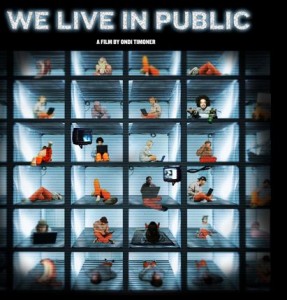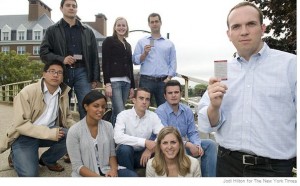 I wrote about this article about the infield fly rule in a blog while back, which points out that laws have to keep evolving to maintain the civility of the masses. There is a rule and the perceived threat of enforcement that causes people to stay within the bounds of acceptable behavior. I talked about this Monday with Ondi Timoner, the woman who made the incredible new movie We Live in Public that deservedly won the grand prize at Sundance.
I wrote about this article about the infield fly rule in a blog while back, which points out that laws have to keep evolving to maintain the civility of the masses. There is a rule and the perceived threat of enforcement that causes people to stay within the bounds of acceptable behavior. I talked about this Monday with Ondi Timoner, the woman who made the incredible new movie We Live in Public that deservedly won the grand prize at Sundance.
There used to be a notion of community, and people would stop at stop signs partly because they knew it was against the law and they might get a ticket, but also partly because they didn’t want to be seen by someone they know because word might get back to the community that so-and-so runs stop signs. It takes community and rules to enforce civilized behavior. In my neighborhood lots of people don’t stop at stop signs now, but I know they know they are breaking the law – I think it’s because they know they won’t get caught and they don’t care who sees them. This is the same neighborhood I grew up in, and people used to stop at stop signs here. I still do.
The outcome, the “what” we need to get to is good old fashioned capitalism and competition, and accountability when it comes to cheating, stealing, and making spectacularly bad decisions in business.
That’s why I was scratching my head a little bit when I read this article in the paper today about a project at the Harvard Business School about a de facto Hippocratic Oath for business people. The title of the article refers to “an Era of Temptation” and I think that’s the wrong way to look at this problem. Temptation has been with us since someone bit into an apple a while back. Organized religion creates a fear of accountability and couples it with a community of whoever attends that group. For all of the things organized religion has going against it, I have to say they still seem to have community and the fear of accountability, some call the fear of god. Temptation has always been there, it’s not a new “era” of it, people have simply figured out that we are in an era of no accountability – and that is what needs to change. So some of the people in financial services and automotive need to be held accountable, and I am not seeing any of that. Community will also need to be there and my guess is that this Harvard effort is a step in the right direction, but something more programmatic is needed to really get the outcome we need.
These people aren’t doing things in secret or in private, they are doing them right out in broad daylight like running a stop sign. In an era of We Live in Public, if we don’t get more aggressive about accountability coming up with an equivalent to a “fear of God”, chaos is the next stop sign where we have to make a decision to stop or go.
-Ric

For the believer, isn’t “Fear and Love of God” the ultimate eternal “What.” On earth we are mostly preoccupied with the materialistic “How.” If we believe there is a superpower watching over all our acts, rights and wrongs, we will be more conscience to “Re-Think” our acts to earn the ultimate here and hereafter “What” outcome? That is for the believer who cannot ignore that all the Universe’s overwhelming creations, orders and wisdom are not accidental. But, are due to a “One Divine God” who we are all accountable to… When we “Re-Think” our ultimate “What” we will approach paradise living; here and in the hereafter…